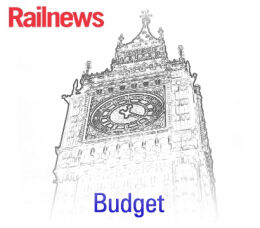Posted 26th November 2025
Rail fares freeze could cost 145m next year

Updated 14.45, 14.52, 15.13
The freeze on regulated National Rail fares in England until March 2027 will have cost £775 million by 2030-31, according to the Treasury.
The immediate reduction in railway revenue, assuming that passenger figures will not rise as a reaction, will be £145 million in the coming financial year.
Other changes in the Budget include funding for the Midlands Rail Hub, Northern Powerhouse and the Transpennine Route Upgrade.
The Treasury’s full list of Budget decisions also notes that the Docklands Light Railway extension to Thamesmead will go ahead, which will be ‘funded through Transport for London and Greater London Authority borrowing’.
It adds that the ‘majority’ of the costs will be met by TfL and the GLA, with the government also contributing ‘over the long term’.
Railway Industry Association chief executive Darren Caplan said: ‘With rail making quite a few headlines recently, and passengers will welcome the freeze on rail fares, today’s Budget contained limited new measures affecting the railway industry and rail businesses.
‘The Railway Industry Association and our members – many of whom have experienced difficult times this year commercially – will welcome the Government’s recognition of the value of rail investment to boosting the UK’s growth and productivity, and its commitment to funding major rail projects, including the recently-announced Docklands Light Railway extension, and continued support for Transpennine Route Upgrade, HS2, East West Rail and Midlands Rail Hub. RIA members around the country will be involved in delivering all of these schemes.
‘However, we would like to have seen in this Budget more of the Government’s plans to encourage innovative funding models in rail – whether private or ‘third party’ investment, more direction on its long term strategy for rail, and an update announcement on Northern Powerhouse Rail, a major scheme which up until recently had general cross-party political support. We urge the Government to give more clarity on these issues, to both boost jobs, GVA and Treasury revenues to the benefit of UK plc, and also to ensure the rail supply sector can play its part to efficiently and cost-effectively deliver world-class UK transport infrastructure in the future.’
‘To make this sustainable, and to give Great British Railways the best possible start, the sector will need clarity on how the Treasury intends to bridge the funding gap while also modernising infrastructure, improving punctuality and accelerating digital transformation. The opportunity now is to treat this as a catalyst for wider reform rather than a standalone intervention.’
Darren Fodey, partner in solicitors Stephenson Harwood’s transportation and trade team, called for more detail: ‘Investment in rail has repeatedly shown to drive growth, with the benefits of investment being felt across the supply chain and across the UK,’ he said.
He continued: ‘The commitment to rail today will give some confidence to the industry, but it forms only part of the wider long-term rail strategy under development as part of the government’s rail reform programme. The supply chain has been calling for more visibility for some time and we now need to see that next level of detail.’
The chief executive of the Campaign for Better Transport Ben Plowden said:‘With the end of the fuel duty cut in due course, a new distance-based electric vehicle charge and freezing rail fares, this Budget is finally starting to rebalance transport costs towards more sustainable modes.
‘The gradual ending of the 5p fuel duty cut will recoup billions in lost revenue which can be used to benefit hard-pressed households and the country, rather than fuel retailers. A proportionate pay-per-mile charge on electric vehicles will help restore fairness to transport taxation and avoid a looming budget black hole as the transition to electric vehicles gathers pace. It will also help offset the “rebound effect” we are seeing in Norway, where electric vehicle ownership is leading to a 10-20 per cent rise in car trips.
‘We are also pleased to see a commitment to fund a number of rail infrastructure projects, including the Docklands Light Railway Thamesmead extension, Midlands Rail Hub, Northern Powerhouse Rail and the Transpennine Route Upgrade. We are however disappointed to see the Lower Thames Crossing in the list of transport investment priorities. Whilst we fully accept the need to meet the transport challenges of southeast England, an expensive road tunnel is not the way to do it.
‘However, the Chancellor missed a huge opportunity to go further by failing to close the aviation tax loophole which exempts aviation fuel duty and allows private jet passengers to fly VAT free.’
What do you think? Click here to let us know.
